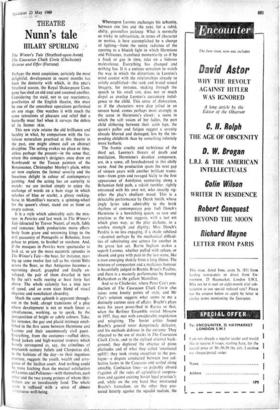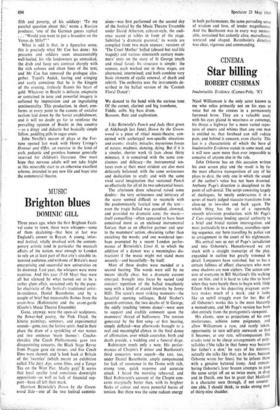THEATRE
Nunn's tale
HILARY SPURLING
The Winter's Tale (Stratford-upon-Avon), The Caucasian Chalk Circle (Chichester) Honour and Offer (Fortune)
Perhaps the most auspicious, certainly the most delightful, development in recent months has been the dexterity with which, in this year's Stratford season, the Royal Shakespeare Com- pany has shed an old coat and assumed another. Considering the staid, not to say reactionary, proclivities of the English theatre, this must be one of the smoothest operations perforined on any stage. One watches it with much the same sensations of pleasure and relief thkt a butterfly -must feel when it surveys the debris of its former skin.
• This new style retains the old brilliance and -lucidity in what, by comparison with the fas- tidious naturalism practised at this theatre in the past, one might almost call an abstract discipline. The setting evokes no place or time, unless perhaps the present—in the sense that, where this company's designers once drew- on Rembrandt or the Tuscan painters of the Renaisiance, Christopher Morley's plain, white set now explores the formal severity and the luxurious delight in colour of contemporary painting. And the acting has an austerity to match: we are invited simply to enjoy the exchange of words on a bare stage in which splashes of blue or scarlet, a glossy rocking- horse in Mamillius's nursery, a spinning-wheel for the queen's closet, stand out as from'-an empty canvas.
It is a style which admirably suits the mix- ture, in Pericles and last week in The Winter's Tale (directed by Trevor Nunn); of myth, fable and romance; both productions move effort- lessly from grave and sorrowing kings to the daft peasantry of Pentapolis or Bohemia; from palace to prison, to brothel' or seashore. And, if the masques in Pericles were spectacular to look at, so are the more eccentric episodes in The Winter's Tale—the bear, for instance, rear- ing up some twelve feet tall as his victinAblts across the floor, so that Antigonus becomes a squirming dwarf, grappled and finally en- veloped, the pair of them dwarfed in turn by the set's walls rearing at least forty feet above. The whole -calamity has a nice turn of speed, and an even nicer blend of visual elegance and nonchalant absurdity.
Much the same aplomb is apparent through- out in the bold, abrupt transitions of a play whose development is not so much linear as simultaneous, working, so to speak, by the juxtaposition of bright or subtle colours. Take, for instance, the gay and placid intimacy estab- lished in the first scene between Hermione and Leontes and their uncommonly civil guest. Everything, from the costumes—ruffled shirts, flared jackets and high-waisted trousers which loosely correspond as, say, the crinolines of nineteenth century Juliets and Cleopatras did, to the fashions of the day—to their ingenious courtesy, suggests the youth, wealth and arro- gance of the Sicilian court. And nothing could be more fetching than the mutual satisfaction of Leontes and Polixenes—with themselves, each other and the two young princes of whom their fathers are so inordinately fond. The whole scene is suffused with a sense of almost ‘01uptuous well-being.
.Whereupon Leontes exchanges his urbanity, between one line and the next, for a rabid, shifty, groundless jealousy. What is normally so tricky to substantiate, in terms of character or motive, is here accomplished by a change of lighting—from the sunny radiance of the opening to a blueish light in which Hermione and Polixenes, transfixed momentarily as if by a freak or gap in time, take on a hideous malevolence. Everything has changed and nothing has. It is a curious sensation to watch the way in which the distortions in Leontes's mind coexist with the relationships already so solidly established—the rank and brutal sexual imagery, for instance, snaking through the speech to his small son, does not so much dispel as overlap Leontes's customary indul- gence to the child. This sense of dislocation, as if the characters were dice jolted in an unseen hand, comes perhaps most strongly in the scene in Hermione's closet: a scene in which the soft voices of her ladies, the pert child slithering between their satin laps, the queen's pallor and fatigue suggest a serenity already blurred and damaged, less by the im- pending childbirth than by something infinitely more barbaric.
The frantic cruelty and turbulence of the third act, Leontes's threats of death and mutilation, Hermione's desolate composure, are, in a sense, all foreshadowed in this chilly scene. And the production spans the next gap of- sixteen years with another brilliant transi- tion—from grim and ravaged Sicily to the first appearance of Autolycus sauntering along a Bohemian field path, a rakish tumbler, rightly entranced with his own wit, who smartly sig- nifies the play's ebullient mood. This is a delectable performance by Derek Smith. whose jingly lyrics take admirably to the brisk rhythms of contemporary pop. Judi Dench's Hermione is a bewitching queen, as rare and precious as the text suggests, with a tart wit which gives way, as the play darkens, to a sombre strength and dignity; Miss Dench's Perdita is no less engaging, if a shade subdued —daunted perhaps by the mechanical difficul- ties of substituting one actress for another in the grave last act. Barrie Ingham makes a superb Leontes, whether puffed with spleen, or shrunk and grey with pain in the last scene, like a man emerging shakily from a long illness. The mixture of compassion and a malicious humour is beautifully judged in Brenda Bruce's Paulina, and there is a masterly performance by Jeremy Richardson as the gallant Mamillius.
And so to Chichester, where Peter Coe's pro- duction of The Caucasian Chalk Circle also raises some knotty points of style; and Mr Coe's solution suggests what seems to me a distinctly curious state of affairs. Brecht's plays were for years proscribed in Russia so that, when the Berliner Ensemble visited Moscow in 1957, they met with considerable trepidation and misgiving. The Soviet critics found Brecht's general tenor dangerously defeatist, and his methods dubious in the extreme.- They objected to the use of masks in The Caucasian Chalk Circle, and to the stylised oriental back- ground; they deplored the absence of pious platitudes and of what they called 'emotional uplift'; they took strong exception to the pro- logue—a dispute conducted between two col- lective farms in the Caucasus and settled along amiable, Confucian lines—as palpably absurd (against all the rules of agricultural coopera- tives and against existing Soviet legal practice'); and, while on the one hand they mistrusted Brecht's formalism, on the other they pro- tested bitterly against the squalid realism, the
filth and poverty, of his soldiery: 'To my puzzled question about this,' wrote a Russian producer, 'one of the German guests replied .. "Would you want to put a brassiere on the Venus de Milo?"' What is odd is that, in a figurative sense, this is precisely what Mr Coe has done: his peasants and soldiers seem unaccountably well-heeled, his vile landowners go unmasked, the drab and fussy sets contrast sharply with the rich colours and clean lines of the text, and Mr Coe has removed the prologue alto- gether. Topol's Azdak, leering and cringing and vastly conscious that he is the kingpin of the evening, tirelessly flaunts his heart of gold. Whatever in Brecht is delicate, enigmatic or contained in terse and powerful imagery is • softened by imprecision and an ingratiating sentimentality. This production, in short, con- forms at every point to the canons of socialist realism laid down by the Soviet establishment; and it will no doubt go far to reinforce the prevailing opinion of Brecht in this country —as a dingy and didactic but basically simple fellow, peddling pills in sugar coats.
John Neville's season of plays at the For- tune opened last week with Henry Livings's Honour and Offer, an exercise in the kind-of arch, pedantic and gormless humour generally reserved for children's literature. One must hope that nervous adults will not take fright at this miserable start to an otherwise excellent scheme, intended to put new life and hope into the commercial theatre.







































 Previous page
Previous page